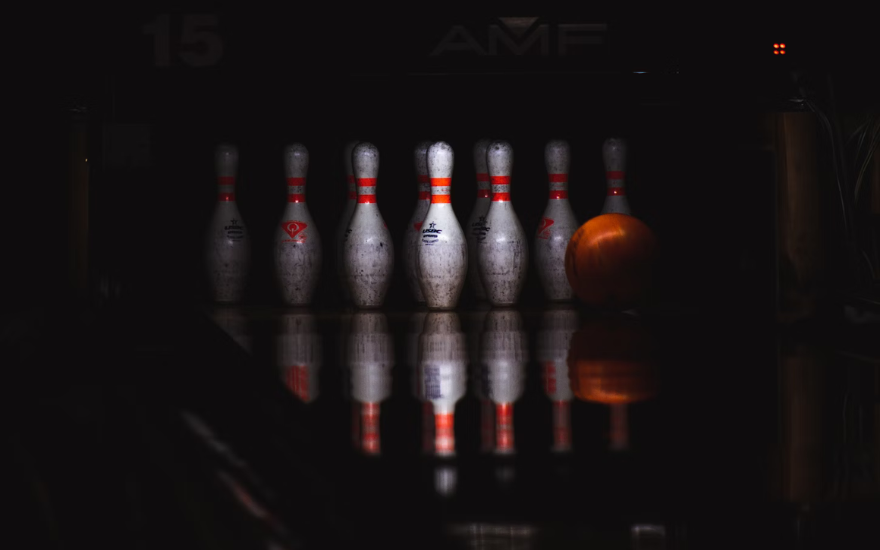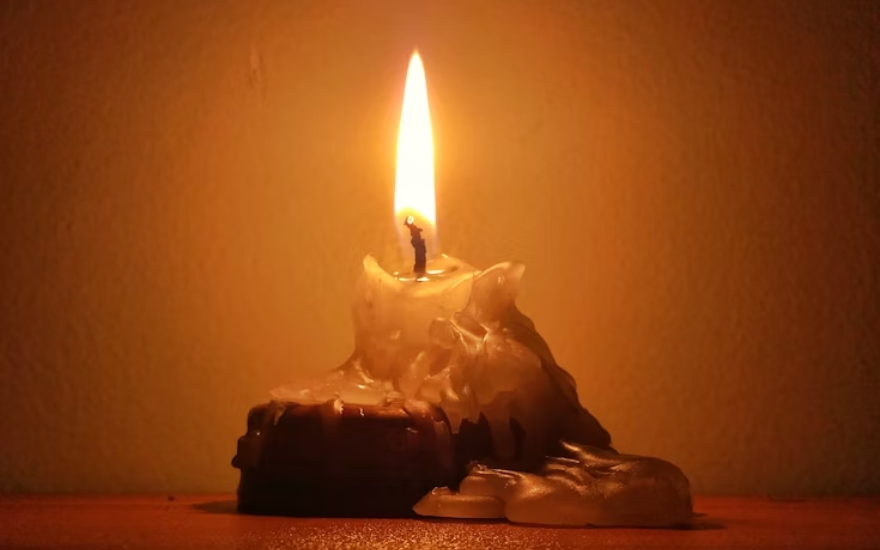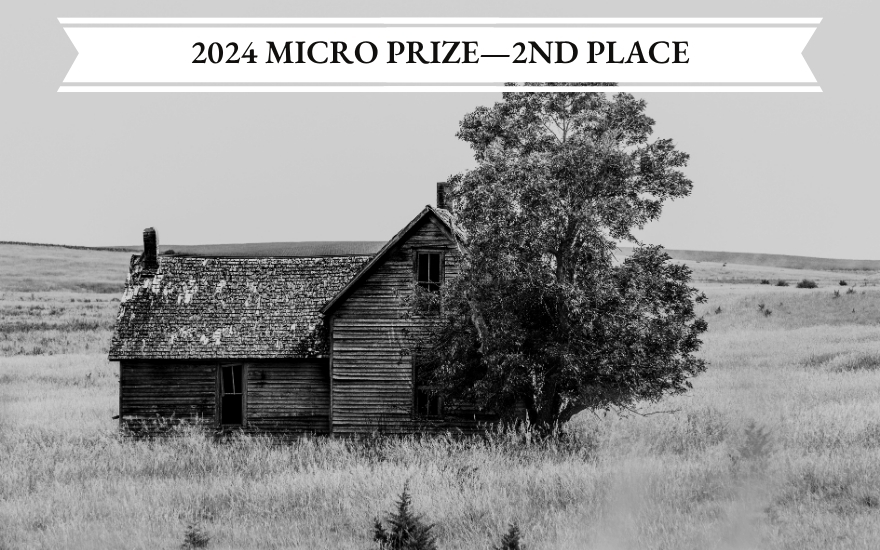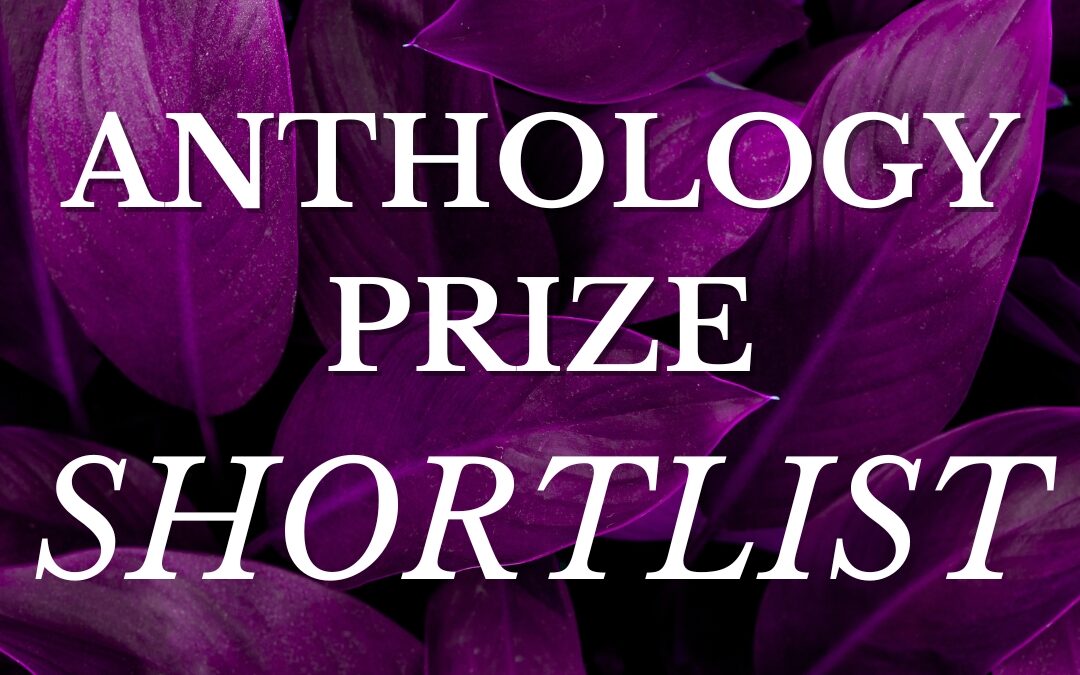
by Julia Strayer | Jun 16, 2025 | micro
My husband has this idea to marry a laundromat and a bowling alley.
“A perfect pair,” he says. “Like us.”
He’s an idiot. Who’d want that?
“Think about it. Now they wait for free, but we could clean up.”
I roll my eyes.
“Maybe some video games or an air hockey table that takes quarters.”
None of that makes sense. A person wants peace and quiet in a laundromat. Just the muffled sound of linens circling the dryer, growing lighter, the air warm and welcoming. Everything clean and fresh.
I head to the bathroom to get ready for bed, a space to myself.
He follows, his voice louder than it needs to be. “Midnight bowling and beer! We could advertise out front with one of those waving air dancers.” He flails his arms around to demonstrate.
I imagine drunk men, their heads inside dryer drums practicing Tarzan screams with some woman’s clean underwear taking the brunt of it. He’s never understood marriage.
“Drunk people willing to stick their fingers into filthy ball holes are germ vectors who shouldn’t be folding laundry.”
“We could charge extra for folding.”
I spit toothpaste into the sink and stare daggers at him in the mirror. “People who like laundromats aren’t the kind of people willing to wear shoes other people’s feet have sweated in.”
“Not everyone is like you. Some people are fun.”
I’ve run out of things to say. All I see is a bright stain on a white dress I can never get clean.
I lie awake in darkness listening to him rattle off ragged breaths and half snores. No one wants the thunder of ten lanes, pins crashing, and the hooting of drunk luck rolling a strike.

by Tara Isabel Zambrano | Jun 12, 2025 | flash fiction
The girl grows overnight after her mother dies–two extra hands emerge from her back, like the Hindu goddess Durga. Her forehead is lashed with lines, her mother’s curses roll on the surface of her tongue. They fall and clog the drains. The girl’s extra hands work as a plunger, extend to the fridge to pick items, fan air on humid days. She starts wearing her mother’s clothes–oversized skirts and blouses and a stained apron, her eyes deliberately keen like a hawk’s. From the park bench, she watches her siblings: the six-year-old and the toddler on the swing, up and down the slides, the teenager on the monkey bars, his scrawny arm barely strong enough to hold on, his fingers slipping. They laugh and run. There’s love in their voices but not enough to call her Ma.
Before her mother died, the girl considered herself an atheist, but now she lights an incense and an earthen lamp every evening, bows her head in front of the metal idols of Krishna and Vishnu lit in orange glow. She whispers OM a hundred and eight times like her mother used to. She wipes the dust off her mother’s framed photo taken at her wedding–her chin lowered, her eyes gazing into her hennaed palms lifted close to her face, the light coming at a slant on her cheeks and forehead, reflecting from the edges of her fingers. She looks radiant unlike how the girl remembers her when she died. But the girl decides this is how she’ll think of her mother, beautiful, confident like she knows her mind.
Most nights, her father falls asleep on the couch, an empty bag of potato chips crunching under his frame. Double chinned and balding. TV on, volume down. Documentaries on wars and planes. Natural disasters. Sometimes he pours a double scotch, sips, and watches the twisted branches of the banyan in the patio, the hinged wings of the warbler, a slow grief accumulating on his face. Then he takes out his handkerchief and wipes his brow. The front door is always unlatched because he goes out and comes in at odd times. The girl starts calling him by his name.
Days splinter. Her hands smell of garlic and garam masala, fingers curved inwards because of constantly holding things. Sometimes, the girl feels she was born a mother. The feeling is so old that her young reflection in the mirror reminds her she is still a girl. Her transformation strange as the fact that they haven’t been out of monsoon, but the wind only brings in the dust and debris through the cracks of the windows and the space below the doors. The sky is crowded with clouds like an unmade bed and rain has left them as all breathing things do. To conserve resources, the girl showers once a week, the water muddy as it drapes around her. The toddler sleeps curved like a bean, his nose pressed into her neck, trying to sniff the semblance between their mother and her. When the teenager plays the violin, suddenly off-key, she reminds him to keep the music simple, carve out the sour notes and start again. At night, her extra hands shuffle through the dark, reach the faces of her siblings and run fingers through their hair, feel the rush of their breath blowing north, press their foreheads with blessings. The girl has varicose veins because of standing too long in the kitchen preparing dal and rotis, scrubbing the greased pressure cooker and the karahi. She chases the kids in her dreams.
Sometimes the girl’s mother appears in the doorway between the kitchen and the patio. “No help will come for you, you’ll only grow hands, one pair from another, light year after light year, and still, it will never be enough,” she says in her usual high-pitched sing-song voice, continues with her tense sips of air as if she’s still breathing.
The girl massages her mother’s scalp−there are dead insects, dried leaves, dirt, as if it’s a little ritual to make her feel at home. Her extra hands swat the flies. Steam from a pot of boiling rice curls in their hair like cobwebs. She offers her a bowl of stir-fried veggies, boiled eggs. Her mother’s mouth opens like a dark, wide hole where all her children can fit in. She swallows the food without chewing. “In afterlife, there’s no metabolism, only hunger,” she says. From the drawn curtains, the sun pokes their eyes. The girl touches her mother’s blue-cooled skin, love handles around her waist, a rice-bowl cavity of her chest and senses a pulse−not enough to be a heartbeat, only a memory of a life that once was.
“I’ll never be whole to reincarnate as long as all my kids are living,” complains her mother, her fingers fluttering like wings. For a moment, everything is quiet, then a hush of her mother’s sigh like a day turning over a page. Her father walks into the kitchen, “You are talking to yourself,” he says and stares at the girl. Her mother half-smiles listening to the sound of her husband’s deep-throated voice, the slight dark between his lips that separates memory from loss. She watches him walk into his room and close the door behind him. Then she plucks the girl’s extra, worn-out hands like two bad teeth.
“What would I do after the children grow up and leave,” the girl asks her mother.
“You will raise your shortcomings as your own child, one that will always stay,” she claims.
The girl looks at her mother’s glinted eyes. She has so many questions, but is unable to find the right words.
“Women have a hard time in this world, but I have high hopes for you,” she says and pinches the girl’s cheeks for good measure before she disappears. The girl feels all the tears inside her rocket like bubbles in a soda bottle. She lets herself weep, needful and gasping. Until she is left with hiccups. Until her face is glazed milky in the moonlight. She wipes the snot from the tail of her apron and unties it. The holes her extra pair had left feel hollow like a contracted womb of a hand-me-down-mother-who-never-birthed-a-child, who craves her mother. She wraps her discarded hands in an old towel and places them under her bed. At night, she hears them scratch the floor, crawling back and forth as if unsure what to look for. How to search another source of blood, another body, another mother to mobilize them.
Originally published in Post Road and Ruined a Little When We Are Born (Dzanc 2024).

by Anais Godard | Jun 9, 2025 | flash fiction
When he walked into her studio, Elodie was sculpting her seventh ceramic penis of the week. This one had antlers.
She didn’t look up. “Custom or classic?”
The man hesitated. He was tall, with nervous shoulders and a brown paper envelope clutched like it contained his last will and testament. “Custom,” he said.
She glanced at him, a quick, assessing look. No sleazy grin, no too-wide eyes pretending not to scan her overalls. His posture said apology. She’d learned to read them, over the years: the oglers, the moaners, the “accidental” touchers. Men who claimed it was about art but watched her work like they were waiting for a lap dance. This one wasn’t like that. This one was here for something else. Something he almost didn’t want to ask for.
Elodie rinsed her hands in the sink, clay circling the drain like it wanted out of this conversation. “Alright. There’s a form.” She handed him a clipboard.
He read the first line aloud. “‘Please describe your member in three words or fewer?’”
“It’s a vibe check,” she said, shrugging.
He wrote: “Not conventionally impressive.”
She raised an eyebrow. “Brave.”
The next part involved measurements, preferences, and the option to provide photographic reference. He slid the envelope toward her.
Inside was a Polaroid, and she appreciated the analog commitment. The photo was… honest. There was no dramatic lighting. No shadow games. Just a man, standing in what looked like a dentist’s office, stark naked, with a hopeful tilt to his head and socks that read “Mondays, amirite?”
She bit her lower lip, but she didn’t laugh. She didn’t need to. He was already doing it.
“I know it’s not—well. People laugh. Even doctors. I just thought… maybe it could be art. You make everything else look heroic.”
She looked at him properly for the first time. Noticed the way his hand twitched on the table. The way he didn’t look at her, exactly—just to the left of her face, like eye contact might crack something still setting. The shadow of a dimple in his three-day beard. Also: broad across the chest. Solid, in that quiet, unassuming way. The kind of body that might make a satisfying sound if slapped.
She blinked. Refocused. “What’s your name?”
“Dave.”
“Alright, Dave. I’ll need you to sit for me. Not nude,” she added quickly, watching the blood flee his face. “Just your energy. It helps.”
He came every Tuesday at 3 p.m. She sculpted. He sat. They talked about Renaissance depictions of masculinity, about humor in Japanese pottery, about growing up small in Texas. Once, she told him about her first boyfriend, who said her work was “cute but not art.” She broke up with him via sculpture. A sad, drooping thing, slightly crooked to the left. That’s how she found her medium and her muse. She hadn’t stopped since.
What she didn’t say was how Tuesdays became her favorite. How she looked for his text. How she liked that he never flirted. That he didn’t treat her like a curiosity or a kink.
That he smelled like cedarwood and tea tree oil.
Seven Tuesdays later, she handed Dave a box.
Inside: a sculpture the size of a thumb. Polished, delicate, burnished gold glaze. It was resting on a pedestal, under a bell jar. And beneath it, a plaque:
Dave. Not large. Just brave.
He stared at it a long time. Then he looked at her.
“You made it beautiful.”
“No,” she said. “You did.”
He kissed her in the parking lot, awkward and warm and a little clay-smelling. It was not a cinematic kiss. It was better. It was true.

by Janna Miller | Jun 6, 2025 | flash fiction
I
A cottonmouth swallows me when I am seven. It waits for me just outside my front door, stretched out along the walkway. When I step into the concrete space, it opens its mouth wide. Hemmed in by coquina walls and boxwood bushes, the only place to go is within the belly of the snake. The last thing I see is white, the color of ice and bone–but supple and fleshy between fangs, until I am gone. I am lodged in the reticulated stomach next to a mouse, who trembles and climbs into my lap.
But this isn’t what happens.
I remember jumping over the white maw. With a running leap and a perfect aerial split, my body glides over loops of coiled muscle. I run down the street and do not look back, not even when my house is a dot on the horizon. Instead, the cottonmouth swallows me again in my dreams. Over and over.
II
I am abducted when I am eight. I am home alone and a man calls me. Do not hang up. Do not hang up. I have your momma. You give me your address right now. Tell me your bra size. Your momma is tied up. I will hurt her. Do not hang up.
And I tell him and I don’t hang up and he comes and gets me. He bangs on the front door until splinters fall off the back and I let him in. His mouth is like the maw of the snake and I am swallowed into him. The mouse trembles in my lap again.
But this isn’t what happens. What really happens is this:
I hang up. I hang up. I hang up. I know that I hang up after minutes of frozen fear–my hand curled into the receiver, my fingernails cut into the plastic. I don’t have a bra size, not yet. My mom is at work and this son of a bitch knows I am at home. One of many kids alone. He pawed through the white pages or the school directory until he found me. His voice grinds into my ears like gravel stuck in a fan. In my nightmares he wears the face of a snake and mouse in my lap becomes a child I cannot save.
III
I am eaten again. This time as an adult. In days and work and children. I am swallowed whole. I do not know if the mouse is nearby. I am too tired to check.
IV
There is a vole trapped under the rug at work. I chase it from one corner of the bookshelf and then back again. I skin my knees on the carpet, my skirt riding up my thighs. I capture it in my hands, warm and soft. He does not tremble, but bites into my flesh again and again. I do not let him go as his teeth puncture the soft pad of my palm. If I lose him in the building, he will be killed.
This is true.
Another morning, I find a snake at the base of the steps, next to my chair. He is cold and docile and I scoop him up. He curls into a spiral in my palm. I recognize this one. It is the same kind my children used to play with outside our front porch. If I lose him in the building, he will be killed.
This is also true. I take both the vole and the snake into the woods and let them go.
V
Inside the warm stomach of my longer days, my dreams have not changed, though sometimes the snake and the mouse resemble each other. I hold them all in my lap: the lost child, the trembling snake, the biting mouse. They regard each other in spinning fantasies and solid regret. Who have I saved? The danger and silence of the world are still as soft as white cotton–as inviting as an open mouth, poised to strike.
I am sure this is true.

by James Montgomery | Jun 2, 2025 | micro
The men are dying.
We’re the boys who see them. In tabloids, on news bulletins. Faces pocked with purple lesions, bodies ravaged by weight loss. Their abandoned eyes, their hollowed-out stares, hold us.
We’re told it’s a plague of our own making. Our fathers—both Holy and holier-than-thou—say it’s unnatural, say their boxes are wired wrong. We sit to these comments daily; as every day as pouring the last remains of dust from a cereal box.
So we hide. In boy-sized boxes we call bedrooms. We while away the hours tuning transistor radios, searching and searching, until, amid the static, we find it: the welcoming shimmer of a synthesiser, a voice that sounds like want.
We lock ourselves in bathroom boxes. Just us and our mom’s Sears catalogue, spine creased to the same few spreads of men in their smalls.
In locker rooms, the wet slap of heat, boxed in by back-row jocks and small-town heart-throbs. We learn how they got hot and heavy with so-and-so, some girl, straddling laps and burning rubber in boxy American muscle cars. And real men don’t wear rubbers, we’re told.
After, if we’re lucky, we wander the long way home, with Tommy or Rico or Scott. We share a box of Marlboros, filched from our folks’ stash. They take a cigarette, lift it to their lips, and we breathe in how it smoulders—the hit, the rush—before they pass it back to us.
When the day comes, when our front doors are slammed in our faces, we shoulder a backpack of belongings—barely enough to show we ever belonged—and hitch a ride with a stranger, wave down a bus. We watch the world whizz by from the window and, through tears—because beautiful boys ugly-cry too—see all the square suburban streets, all the boxes of buildings where we stored our lives, blending and blurring into one. And we free our favourite cassette from its case, ease our headphones on, and travel to those cities that have always sounded like home, travel to where our real lives are waiting, new and ours and unboxed.
Originally published in Reflex Fiction.

by Theresa Sylvester | May 29, 2025 | contest winner, micro
There’s a photo of our father, donning a black suit, standing under a tree, with a mischievous smile and a diamond stud in his left ear.
He was at a wedding, at a funeral, at a party, at a business meeting, outside a church, behind a courthouse, in another city, in another country–everywhere, all at once.
There are eight duplicates of this picture in frames made of gold, silver, or ornate wood matching his brown skin. It hangs on a wall in a living room, sits on a desk in an office in Lusaka, or rests on a bedside table next to a rosary that glows in the dark.
His offspring, all eight of us, sit around the fire, trading stories late into the night. Our mothers are inside, scattered in undesignated spaces, leaving us to sip cheap wine while we search for our father. We find him in our oldest brother’s swaggered gait, in the bridge of our baby sister’s nose, in the long fingers of another, in a tooth gap, in broad shoulders, in our misty eyes.
We stoke the fire and unpack our memories, holding them up to the embers. One of us claims our father attended their graduation carrying such a massive bouquet it shielded his face. Another swears they spotted him from behind at a political rally, but lost sight of him in the crowd. Someone heard his laughter in a room brimming with voices, or caught a whiff of his woody scented perfume in a barbershop in Lilongwe, or stumbled upon a gold pen identical to the one he wore on his suit pocket at a till in a bank.
To liven things up, we mimic the sound of his yellow Datsun Skyline vrooming off because he always had somewhere else to be. Spit sprays from our lips and we burst into laughter.
We pull into a huddle, promise to stay in touch, that our children will be cousins, and their childhood won’t be as fractured.
We are all here, entwined in his intricate web.
The mud that clung to our shoes at his graveside in the morning is now dry.
None of us wants the night to end, yet we harmonise to a song he sang to us as children;
Tulo? Eh?
Ubwela? Enhe!
Tulo? Eh?
Unzune? Enhe!
Sleep? Yes?
Are you coming? Yes!
Sleep? Yes?
Will you be sweet? Yes!

by Laura Sciortino | May 27, 2025 | contest winner, micro
They sit in silence on the farmhouse porch. It’s nothing, he hopes.
Earlier as his wife lay sleeping, toes twitching, nightgown transparent from sweat, he’d turned away, denying her protracted slumber meant anything. He brushed teeth, brewed coffee, ignoring his knotted gut.
“You’re quiet,” he says, admonishing himself for waiting until hope has ballooned
inside his aching chest.
Her palms rest on the Adirondack chair, preparing. She’s beautiful, undiscouraged by 74 years. “I’ve decided to become a giraffe,” she states.
But we haven’t even hung the hammock yet.
Clinging is futile. He must muster courage.
I can do this. What’s one more go-round?
Yet something twists. He’s tired. Hungry.
He wants ham on rye. He winces at his predictability, but there it is. He likes Dijon. He likes to shit on the toilet. He likes being an old man.
How many more years do we have?
Her head cocks against the cedar backrest. She gazes up, previewing her new
dominion. It isn’t the first time she’s uprooted expectations. This is how they’ve worked
things … maintained freshness, stoked passion.
As newlyweds, she signed them up for a workshop: “Live the Animated Life!” As
they walked to the train that bitter morning, he’d smacked his gum. It was Saturday. He
liked sleeping in. Through the scarf held to her nose, she’d hissed, “I hate it when you
smack.” He’d snapped, “What do you want from me?” Inside a steamy, glass-ceilinged
conservatory surrounded by flora, their flamingo instructor taught them they were snakes, coiled and defensive. They’d slithered home and promptly shed.
Since that verdant day, they’d been tortoises, eagles, woolly-bear caterpillars, foxes. It helped avert his midlife crisis. She’d breezed through menopause.
But the last few years, they’d settled down. Knitting was pleasant, as was reading. It was nice to sit in cars and eat with forks. He liked tinkering with his terrarium.
Her neck elongates. Her gaze is farther away … eyes larger, sadder. Soon, her jaw will protrude.
One last kiss before?
Too late. She’s already removed her glasses, stands barefoot in the grass.
And if I don’t go along? I could straddle her neck?
He’s grateful they made love last night. When she’d arched her back, howling, he’d recalled the year they were coyotes. Never still. Nothing unturned, untried.
The sun is high. He squints.
She’s really getting up there, casting a longer and longer shadow.
What now?

by Fractured Lit | May 24, 2025 | news
We finally curated a shortlist of 41 stories, and they’ve been sent to judge, Tara Isabel Zambrano! It’s out of our hands, and we can’t wait to see which stories Tara chooses to include in the final 20 for the anthology!
- Wife 2.0
- Veterans
- No Soap
- After the Rocket
- Abraham Ritter: March 7, 1949—
- Isopentyl acetate
- Jigsaw
- Christina
- Lightyears Away
- One Day in December, My Trapezius Decided to Write a Short Epic Poem
- Nest
- Feeling Cakes
- Blossoming
- Before The Everything After
- Dog Years
- Sister Sister
- Scintilla River
- Ripe
- Good Dog
- Another Friday
- Weed
- Rock Dove
- Burn
- New You Wig Emporium
- Last Things
- Close and Far Away
- Blackberry Pie
- Sick Day
- Some of Us Notice the Berries
- Miss Tafia, Her Snakes and Her People
- The Verizon Guy
- Kintsugi
- Big Top
- The Bride Is Eating Cake and the DJ Is Playing Werewolves of London
- Birds
- Richter Scale for Heartbreak
- Empty Bottle
- Percussion of Empty Rooms
- Didn’t We Realize We Were Drowning?
- Hands
- By the Sea, By the Sea, By the Beautiful Sea

by Janet Fancher | May 22, 2025 | contest winner, micro
There’s a picture from my wedding where my father looks at me with his face all screwed up with concern and his hand scratching his head. Forty years later, on the couch at the dementia ward where he now lives, and I visit, he gives me the same look. This time, I’ve called the brown thing in front of him a table, and he isn’t certain I am right. Last week he told me about the world he used to live in, this week this is the only world he lives in. Gone are the roads and the hills and my mother and cars and fishing. Much simpler this way.
He pats his shirt pocket where he keeps his glasses. When he can’t find his, he steals other peoples’ glasses. My brain, he says. Why don’t you wear them? I ask, and I get that look again. My brain, he says more emphatically, so I will understand his need to only bring them out in the most dire circumstances.
Gone is his walking. Gone is his scratching out numbers in some obscure equation. Gone is his lanky body at the dining table trying to explain story problems to me. Gone are the gardens and house and the trip to China and the exact way he reloaded the spoons in the dishwasher after my apparently feeble efforts.
We look at family photo albums. Occasionally he reaches out and touches the face of someone. Gone are the names, though he doesn’t seem to care. Look at the old people, he says about the pictures of his parents. He touches an ancient picture of me, says That one was trouble.
Even baseball disappears. I give him his glove with the softened and scratched leather, and he turns it and turns it. Gone is the National Championship he was so proud to win. Gone are his buddies and their rallying cry of Let’s We Go. Gone are the days he called me scatter arm. Gone, all of it, to some other planet. The glove so used it folds in on itself. Finally, he slides his fingers into the glove and smacks the palm. He winds up and mimes throwing a ball at me. I catch it, and across the universe, I throw it back.

by Linda Shapiro | May 19, 2025 | micro
Occasionally I walk here, when the weather permits.
Today I spot a man watering his garden, a riot of grasses and Yarrow bushes colonized by bees, prairie flowers penned up with Zinnias. A tall and forbidding something with bulbous green knobs that attracts wasps, which the gardener identifies as Rattlesnake Master.
He says the garden harbors hummingbirds, or maybe only one that sometimes comes right up to his face and flutters its wings as if to thank him.
Throughout the neighborhood numbered streets loop off of numbered avenues, like math problems with many possible solutions. It is possible to lose your way.
Simple bungalows with complicated angles line the quiet streets, stucco and brick with gingerbread accents. I long to gaze in the windows at night, when faux antique lamps are lit, to see the occupants eating, reading, watching TV. Miming conversations I cannot hear.
But I never walk here at night. As an elderly woman I cannot take such chances.
Still, in the daylight worrisome situations reveal themselves, like a dusty room exposed to sunlight. A lawn scorched by chemical treatment, a patio with broken furniture mended by duct tape. Hints of mold and spots of rot.
I ignore these things or take them in stride. Overall the neighborhood suits me. The vegetative flourishes, the eccentric houses have the feel of a mythical village that appears Brigadoon-like, only when I enter.
When I was a child my brother and I were sent off to the fields surrounding our house with Velveeta cheese sandwiches, and apples we neglected to eat. We played at games I no longer remember, but there was risk and there were riddles of our own making to solve, all on our own.
I feel as if I have wandered these streets forever. As if the gardens sprang up for me and arranged themselves not only to my liking, but for my survival. I am at home, no longer young and hinged together at all the wrong junctures.
The neighborhood shelters me, who I have become.
Sometimes I imagine creeping into someone’s garden, into the man’s garden perhaps. There I might succumb to the elegance of adaptation, allow my sooty feathers to catch the sun and glow with spectral colors, a whir of wings in the fading light.











Recent Comments